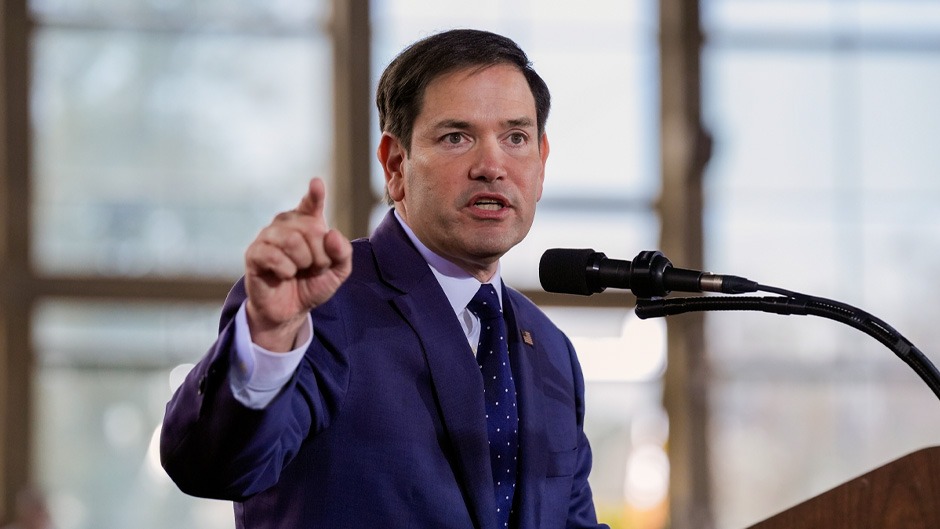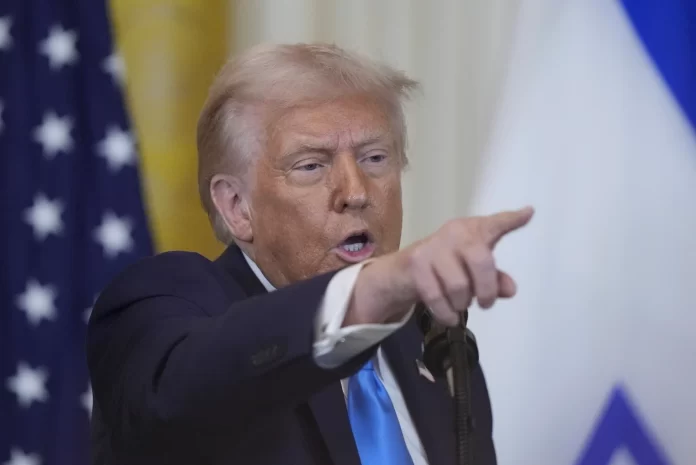U.S. President Donald Trump issued a strong ultimatum on Monday, demanding that Hamas release all hostages held in Gaza by midday Saturday. If the militant group fails to comply, Trump suggested that the Israel-Hamas ceasefire should be canceled, allowing hostilities to resume.
Trump acknowledged that Israel might have a different stance on the matter but expressed frustration over the condition of the hostages recently freed by Hamas. He criticized the group’s decision to halt further releases, saying that all remaining captives should be freed at once rather than in small groups.
“As far as I’m concerned, if all of the hostages aren’t returned by Saturday at 12 o’clock, I think it’s an appropriate time to cancel [the ceasefire], and all bets are off—let hell break out,” Trump told reporters in the Oval Office. “We want ‘em all back.”
Trump also hinted at using U.S. foreign aid as leverage against Jordan and Egypt, stating that he might withhold financial assistance if the two nations refuse to accept Palestinian refugees displaced from Gaza. His comments come ahead of a scheduled meeting with Jordan’s King Abdullah on Tuesday.
Trump’s remarks followed widespread confusion regarding his proposal for a U.S.-led reconstruction effort in Gaza. The former president had earlier suggested a plan in which the United States would take control of the enclave, transforming it into a prosperous economic hub—what he called the “Riviera of the Middle East.”
During an interview with Fox News’ Bret Baier, Trump stated that displaced Palestinians would not have the right to return to Gaza under his plan. This contradicts previous statements from his own administration, which indicated that any relocation would be temporary.
Trump proposed negotiating a deal with Jordan and Egypt to permanently resettle Palestinians outside of Gaza, citing the significant financial aid the U.S. provides to both countries. “We give them billions and billions of dollars a year,” he noted. When asked whether Palestinians would be allowed to return to Gaza, Trump responded, “No, they wouldn’t, because they’re going to have much better housing.”
“I’m talking about building a permanent place for them,” he continued, adding that it would take years for Gaza to become livable again.
Trump’s suggestion that Palestinians should be permanently relocated has sparked significant backlash. Rights groups and the United Nations have condemned the proposal as ethnic cleansing, while Arab states have categorically rejected any forced displacement of Palestinians.
Senior Hamas official Sami Abu Zuhri called Trump’s remarks “irresponsible” and warned that such plans could ignite further conflict in the region. Meanwhile, Israeli Prime Minister Benjamin Netanyahu praised Trump’s broader redevelopment proposal but suggested that displaced Palestinians would be allowed to return to Gaza after its reconstruction.
“They can leave, they can then come back, they can relocate and come back. But you have to rebuild Gaza,” Netanyahu stated.
Further adding to the confusion, U.S. Secretary of State Marco Rubio, who is set to make his first official visit to the Middle East later this week, suggested that Palestinians would need to “live somewhere else in the interim” during the reconstruction of Gaza. However, he stopped short of explicitly ruling out permanent displacement.

The U.S. State Department has yet to clarify the apparent contradictions between Rubio’s statements and Trump’s firm stance on relocation.
Trump’s comments have also heightened tensions with Israel’s neighboring countries. Egypt and Jordan, both key U.S. allies, have made it clear that they oppose any forced relocation of Palestinians, warning that such actions could destabilize the region.
Egypt’s Foreign Minister Badr Abdelatty met with Rubio in Washington on Monday, reiterating that Arab nations stand with the Palestinian people in rejecting Trump’s plan. Cairo is particularly concerned that Palestinians could be pushed across its border with Gaza if forced displacement were implemented.
Despite the strong opposition, Trump remains committed to his vision for Gaza’s transformation. He suggested that between two and six new communities could be built outside the conflict zone, offering Palestinians modern housing and infrastructure.
“I would own this. Think of it as a real estate development for the future,” Trump told Fox News. “It would be a beautiful piece of land. No big money spent.”
His remarks underscore his belief that a large-scale redevelopment effort—potentially led by U.S. interests—could reshape Gaza’s future. However, with mounting resistance from Palestinians, Arab states, and international organizations, Trump’s ambitious proposal faces significant hurdles.

